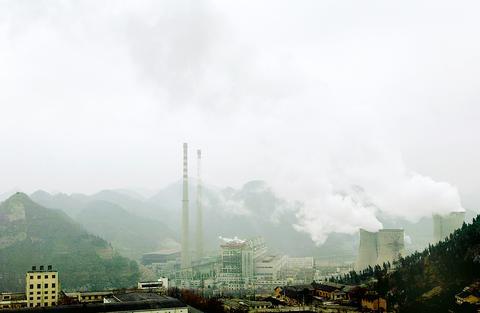China has ordered emergency ship-ments of coal by road and waterways to help ease severe energy shortages said to be the worst in two decades, state media reported yesterday.
Coal will be transported by expressways from major mining areas to the coast and then shipped to eastern and southern areas worst hit by shortages, said reports in the Shanghai Daily and other state-run newspapers.
The Communications Ministry, which oversees transport, has requisitioned cargo ships from international shipping lines to help boost coal shipments, and major Chinese ports have beefed up their coal facilities to help meet demand, the official Xinhua News Agency reported.

PHOTO: AFP
China is facing its worst sum-mer power shortage since the early 1980s, with the shortfall of electricity forecast to hit 30 million
kilowatts.
Major cities like Shanghai have darkened decorative lighting and ordered factories to cut back or switch hours of production. Man-agers of shopping malls, hotels and office buildings have been told to reduce air conditioning during the hottest hours of the day.
With industrial output soaring amid 9 percent-plus economic growth, supplies of coal and electricity have failed to keep up with surging needs.
Demand for electricity rose 16 percent in the first six months of this year over the same period last year, Xinhua reported, citing government statistics.
It said cities across the country imposed 757,000 power brownouts during that time.
Though they are year-round, power shortages are most acute during China's brutally hot summers, when air conditioning gobbles up about half of all electricity consumed by major cities.
In cities along the Yangtze River, including Shanghai, summer high temperatures tend to hover between 30?C to 38?C, often for weeks on end. Now that most residents can afford to install air conditioners, the government is asking manufacturers to develop energy-saving models to help reduce consumption.
Meanwhile, transfers of electricity from the resource-rich western parts of the country to the industrialized east have been stepped up, Xinhua said.
West-to-east power transfers rose 56 percent in the first half of the year from a year earlier, to 14.2 billion kilowatt hours, it said, citing data from the China Southern Power Grid. Most of the transfers went to Guangdong, which is a key export manufacturing region.
China plans to more than double its electricity output by 2020. The government, grappling with severe air pollution problems, is looking to shift some of that away from coal-burning plants and to nuclear power, wind power and tidal energy.
Earlier this week, the government announced it has approved a new nuclear power plant at Sanmen, Zhejiang Province.
The plant will have a combined installed capacity of 12 million kilowatts when it begins operation in 2010, Xinhua reported.
China has plans to build as many as 32 large 1,000-megawatt nuclear power reactors over the next 16 years.

The CIA has a message for Chinese government officials worried about their place in Chinese President Xi Jinping’s (習近平) government: Come work with us. The agency released two Mandarin-language videos on social media on Thursday inviting disgruntled officials to contact the CIA. The recruitment videos posted on YouTube and X racked up more than 5 million views combined in their first day. The outreach comes as CIA Director John Ratcliffe has vowed to boost the agency’s use of intelligence from human sources and its focus on China, which has recently targeted US officials with its own espionage operations. The videos are “aimed at

STEADFAST FRIEND: The bills encourage increased Taiwan-US engagement and address China’s distortion of UN Resolution 2758 to isolate Taiwan internationally The Presidential Office yesterday thanked the US House of Representatives for unanimously passing two Taiwan-related bills highlighting its solid support for Taiwan’s democracy and global participation, and for deepening bilateral relations. One of the bills, the Taiwan Assurance Implementation Act, requires the US Department of State to periodically review its guidelines for engagement with Taiwan, and report to the US Congress on the guidelines and plans to lift self-imposed limitations on US-Taiwan engagement. The other bill is the Taiwan International Solidarity Act, which clarifies that UN Resolution 2758 does not address the issue of the representation of Taiwan or its people in

US Indo-Pacific Commander Admiral Samuel Paparo on Friday expressed concern over the rate at which China is diversifying its military exercises, the Financial Times (FT) reported on Saturday. “The rates of change on the depth and breadth of their exercises is the one non-linear effect that I’ve seen in the last year that wakes me up at night or keeps me up at night,” Paparo was quoted by FT as saying while attending the annual Sedona Forum at the McCain Institute in Arizona. Paparo also expressed concern over the speed with which China was expanding its military. While the US

SHIFT: Taiwan’s better-than-expected first-quarter GDP and signs of weakness in the US have driven global capital back to emerging markets, the central bank head said The central bank yesterday blamed market speculation for the steep rise in the local currency, and urged exporters and financial institutions to stay calm and stop panic sell-offs to avoid hurting their own profitability. The nation’s top monetary policymaker said that it would step in, if necessary, to maintain order and stability in the foreign exchange market. The remarks came as the NT dollar yesterday closed up NT$0.919 to NT$30.145 against the US dollar in Taipei trading, after rising as high as NT$29.59 in intraday trading. The local currency has surged 5.85 percent against the greenback over the past two sessions, central